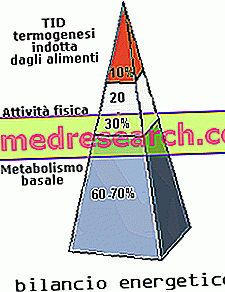What is Carnitine
Carnitine chemistry
Carnitine (β-hydroxy-γ-N-trimethylaminobutyric acid, 3-hydroxy-4-N, N, N-trimethylaminobutyrate) is an amino acid (not ordinary and not even essential) involved in the metabolism of most mammals, plants and of some bacteria.
Carnitine is widespread in two isomeric configurations:
- L-carnitine : metabolically active, it is present in foods of animal origin and in certain food supplements to lose weight or improve sports performance; it is characterized by very low toxicity
- D-carnitine : considered toxic to humans, as it inhibits the endogenous synthesis of L-carnitine.

Lose weight with Carnitine
Metabolic function of carnitine
By allowing long chain fatty acids to move from the cytosol to the mitochondria, carnitine is an indispensable factor for the beta-oxidation of lipids in cells. For this reason, many people hypothesize that increasing the concentration of carnitine in the body may lead to an increase in the consumption of fatty acids, thus an improvement in sports performance and / or an acceleration of weight loss. It is not so, but in order to understand the reasons for this conclusion it is necessary to take a small step back.
Carnitine: it is NOT essential or even lacking
Discovered in 1905 by observing the composition of muscle tissues, with regard to its metabolic importance, carnitine was named vitamin BT. However, it was soon discovered that, starting from the lysine and methionine precursors, the liver and kidneys (in physiological conditions) are able to produce it satisfying the demands of the entire organism. Since then, carnitine was no longer considered a vitamin, but rather a vitamin-like factor, undoubtedly fundamental but not at all "essential".
Note : In nutrition, ONLY those factors that must necessarily be introduced with the diet are considered essential. We also remember that carnitine is very abundant in meat, in offal and in fish; there are also moderate concentrations in milk and derivatives.
Its lysine and methionine precursors, on the other hand, are essential. Although essential for a myriad of metabolic functions, they are hardly lacking in the diet of a healthy person. Vegans do not take carnitine, but they introduce (not exciting) quantities of lysine from legumes and methionine from cereals (Carnitine status of lactoovovegetarians and strict vegetarian adults and children).
Why does taking carnitine NOT lose weight?
From the previous paragraph it emerges that carnitine is neither an essential molecule, that is that the organism is not able to produce alone, nor a nutrient "potentially" lacking in the collective diet. However, even if you are sure you have enough, it remains to be seen whether increasing your carnitine intake can somehow enjoy certain metabolic benefits.
Starting from the assumption that the studies carried out have always given negative or inconclusive results, it is essential to try to understand the reason. First of all, it is reasonable to think that the density of carnitine molecules on mitochondrial membranes is a difficult factor to modify. In this case, even if you take large amounts of carnitine, it would be like trying to put 20 cars in a 10-seater car park. The remaining 10 machines would continue to idle waiting for an empty seat; in the case of carnitine, the metabolism of the liver takes place and the consequent expulsion with the kidneys. Moreover, it is not even obvious that carnitine taken orally is absorbed. In the study entitled "Disposition and metabolite kinetics of oral L-carnitine in humans" (published in the Journal of Clinical Pharmacology) it emerges that no advantage is gained in oral intake of more than 2 g of carnitine at a time, as absorption reaches the saturation level with this dose. S
and consider that a beef steak weighing 200 g contains up to 280-290 mg of carnitine, it is reasonable to think that the daily diet allows us to reach the saturation limit almost completely. This explains why, following an adequate diet and in conditions of good general health, supplementing with carnitine does not lead to any metabolic advantage such as, for example, incentive to lose weight.
Integration
When to supplement with carnitine?
Carnitine supplementation may be necessary only in certain circumstances:
- Chromosomal alterations: some studies have observed that, among subjects affected by a particular chromosomal anomaly (A common X-linked inborn error of carnitine biosynthesis may be a risk factor for nondysmorphic autism; Researchers investigated possible link between carnitine deficiency and autism), about 1 male out of 350 is unable to produce sufficient amounts of carnitine, with very serious health consequences.
- SPDC: there is also a genetic defect in the transport of carnitine membrane, called Systemic Primary Deficiency of Carnitine (SPDC) which, in the United States occurs in about 1 in 50, 000 people; in this case it has been demonstrated (Systemic primary carnitine deficiency: an overview of clinical manifestations, diagnosis, and management) that the integration with carnitine satisfactorily cancels the relative complications.
- SDC: a secondary deficiency of carnitine (SDC) may occur in the case of malnutrition and malabsorption (especially coexisting). In this case, resolution of the malabsorption and integration with carnitine may be indispensable.
How to supplement with carnitine?
On balance, carnitine supplementation does not seem a good way to lose weight. Nevertheless, practicing intense sporting activity and following an unbalanced diet (two factors that, if combined, equate to an act of masochism) the integration with carnitine could bring some small benefits.
Carnitine is available in powder and in tablets, alone or in association with other nutritional factors (eg creatine, arginine, etc.). Given and given what is stated in the paragraph "Lose weight", we advise you not to exceed the dose of 2 g of L-carnitine per day and to take it away from the main meals.
Note : it goes without saying that, acting as a carrier of fatty acids within the mitochondria, the efficacy of carnitine depends on the general metabolic trend. This means that, if the organism is under the influence of high concentrations of insulin (it favors liposynthesis and hinders lipolysis), triggered by an exuberant food intake, carnitine will have no effect. On the contrary, to emphasize its cellular role, it is essential to respect a weight loss diet and regularly practice low intensity and high volume aerobic exercise.
What else is carnitine useful for?
Let's make a final comment on the effect of carnitine on sports performance. After many studies, it was concluded that the individual response varies significantly from one subject to another, also based on metabolic commitment.
Furthermore, carnitine has been studied as a potentially effective factor in the treatment of various cardiometabolic pathologies (diabetes, heart failure, etc.). However, the results are inconclusive and no effect seems to emerge on the prevention of mortality associated with cardiovascular conditions and on serum lipids (with the exception of a possible lowering of LDL), on most renal and hepatic parameters; it is possible that the concentration of c-reactive protein in the blood may slightly decrease. The effects on mortality and on the outcome of pathologies are unknown.



